
The Scholarship recipients 2023 Information is from the applications
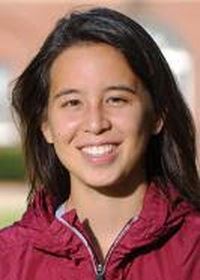 Jennifer Guidera, (UC San Francisco) Bioengineering
Jennifer Guidera, (UC San Francisco) Bioengineering
Jennifer's scientific inquiries are aimed at understanding how the brain generalizes from past experiences. To address this, she developed a rat model of generalization, performing 18-24-hour surgeries to implant probes into rat brains. Analogous to the task of grocery shopping, rats learn to navigate between goal locations in a maze according to a rule. Following this initial learning, rats are placed in new mazes, akin to new grocery stores, or in a familiar maze with new goal locations. In these novel settings, rats reacquire the food-finding task. Her studies have shown very different patterns of activity in the cells within the hippocampal and prefrontal cortex that suggest distinct roles for these structures in generalization.
Jennifer's long-term goal is to understand how the brain processes information to support cognitive functions in health and how this processing is impaired in disease.
One of the professors who oversees the lab in which she works called her "a superstar. . . [her] results are nothing short of spectacular." "Amazing" cropped up frequently in her letters of recommendation.

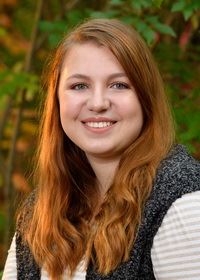 Katherine Magoulick, (UC Berkeley) Integrative Biology
Katherine Magoulick, (UC Berkeley) Integrative Biology
Katherine's work examines the controls on mammalian migration during the Great American Biotic Interchange (GABI). She uses the fossil record to study past migrations--why did some species migrate while others did not? During the period under study (approximately 2.5 million years ago), there was a series of migrations across the isthmus of Panama between North and South America. Her dissertation research focuses on establishing the ecological drivers of the patterns of dispersal and thereby, it is hoped, increase our ability to make predictive models to conserve living biota and improve our ability to predict how animals will move across the landscape as the climate changes.
Her research uses ecological niche modeling (ENM) to determine the extent to which climatic factors alone can account for the migration patterns or whether other factors such as predation intensity are needed to explain these patterns.
The broader impacts of this work range from strengthening online repositories of paleontological data to enhancing our understanding of how species will respond to ongoing global change.
In recommendation letters, her professors call her "passionate, organized, and committed" and note that her work is a "fresh, rigorous, invigorating new approach."

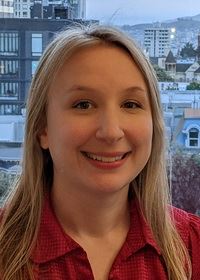 Thaïs Miller, (UC Santa Cruz) Literature (Gilliland Award) We have received a Thank You note from Thaïs
Thaïs Miller, (UC Santa Cruz) Literature (Gilliland Award) We have received a Thank You note from Thaïs
Thaïs' dissertation, "Vaudeville to Netflix: One Hundred Years of Jewish Humor," "combines traditional humanities research and creative writing. Jewish humor, a longstanding survival mechanism in the face of antisemitism, has recently been modernized on digital streaming platforms by contemporary American women and nonbinary writers, including women of color, becoming a crucial mechanism of resistant to antisemitism, systemic misogyny , and other forms of intersectional oppression. . . Content creators engage in feminist midrash, a mode of storytelling, inspired by a form of biblical exegesis, that aims to answer and explore difficult ethical questions."
In addition to fulfilling all the requirements of a traditional dissertation, Thais is also writing a novel, California Kvetchin', that incorporates all of the new narrative techniques used by the twenty-first-century content writers, explores the ethnic history of Los Angeles, and plays with filmmaking in its form.
One of her recommendations begins "Rarely have I encountered a graduate student about whose future success I was more confident."
Note added 8/30/24: In the spring of 2024, I completed my Ph.D. in Literature with a Creative/Critical Writing Concentration at the University of California, Santa Cruz. I accepted a tenure-track Assistant Professor of Creative Writing (Fiction) position at the University of Central Arkansas, which is where I am currently teaching creative writing courses.
Remy Nguyen, (UC Santa Cruz) Biomoleculer Engineering & Bioinformatics (Hendess Award) We have received a Thank You note from Remy
As Remy notes, "Law enforcement agencies have increasingly relied on DNA evidence to solve cases and generate leads. . . . Even so, many common forensic samples . . . may not be suitable" for the current kinds of analysis because the DNA is too degraded or the sample is too small. Remy's research "tackles this problem through the development of computational approaches for genetic identification from sub-optimal DNA," in particular through a tool she has developed, thus providing "a powerful new approach to DNA-based forensic comparison." Of course, these tools can open up "worrisome avenues for personal identification." They can also be of great help to the international NGOs trying to identify victims and perpetrators in armed conflicts around the world. Therefore, it will be important for scientists, the criminal justice community, and society as a whole to ensure that the technology is used for the common good.
Remy's professors call her "capable, hardworking, and motivated," with an "outstanding work ethic."
.200.jpg) Cody Pham holding a Hermit Thrush, (UC Davis) Ecology (Norall Award)
Cody Pham holding a Hermit Thrush, (UC Davis) Ecology (Norall Award)
Cody is studying birds on farmland. Given that agriculture occupies almost 40 percent of earth's land and that bird populations worldwide are shrinking, "protecting wildlife on farms will be essential to preventing extinctions worldwide. . . . Recent research demonstrates that increasingly common heat waves are leading to rising mortality of farmland bird nestlings." Cody is investigating how maintaining trees and other shaded habitats can safeguard wildlife from extreme temperatures. His study will describe how heat-driven changes could influence reproductive success. "With information about what habitat birds rely on when temperatures spike and how much of that habitat they need to successfully reproduce, farmers can identify the type of non-crop vegetation they need to maximize crop production while ensuring that birds can thrive."
According to his professors, Cody is "academically superlative" and "a highly independent researcher and teacher with creativity and insatiable curiosity."
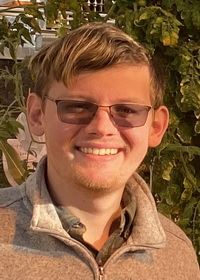 Reagan Reed, (UC Davis) Plant Biology
Reagan Reed, (UC Davis) Plant Biology
Reagan is a researcher working to apply gene editing technologies to improving crop seed traits. Currently he is working with potatoes, which are grown from tubers. This kind of propagation competes with the food supply (10 percent of potatoes are used for replanting) and requires a lot of storage space. These shortcomings could be eliminated if potatoes were planted as seeds. Troublesome genetics, however, have prevented potatoes from being converted to a seed-grown crop. Reagan is working to overcome these problems, seeking to generate potato plants that will have the exact ploidy and genetic composition in each generation, allowing potatoes to have the increased yield, storability, and disease resistance of a seed-grown crop as well as the stable genetics of tubers. In addition, extension of this approach could be valuable to other crops as well.
Regan's professors cited his "intellectual creativity and technical ability" and noted that he has the "skills, determination, and energy to succeed in his quest."

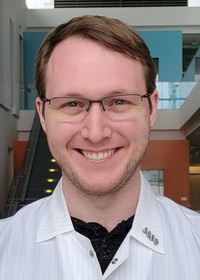 Nicholas Stevers, (UC San Francisco) Biomedical Sciences (Reed Award)
Nicholas Stevers, (UC San Francisco) Biomedical Sciences (Reed Award)
Nick describes his research into "the molecular 'whack-a-mole' of tumor mortality" this way: "As cells divide, the ends of their chromosomes, called telomeres, slowly erode away. Telomeres act like a molecular 'clock' and determine a cell's lifespan. Most cells in our body have a limited lifespan because their telomeres shorten over time. However, some cells, like stem cells, can stay young and keep dividing forever because they produce telomerase, a protein that replenishes telomeres. Just like stem cells, over 90 percent of human cancers achieve immortality by reactivating production of telomerase, a requirement for the endless cell division that leads to tumor formation and health consequences. . . . The reversal of telomerase production is a long-standing but unfulfilled goal in cancer therapy. Understanding how these mutations reactivate telomerase production is a critical step toward this objective, but the mechanism remains unresolved for most . . . cancers." Nick is studying the mechanism of reactivation. He has already discovered that at least sixteen different cancer types (likely more than fifty overall) rely on the same exact single mechanism to achieve tumor immortality--the "Achilles heel" of cancer.
In addition to his groundbreaking research, Nick has, in the words of one of his professors, "saved my lab tens of thousands of dollars by repairing mechanics and wiring of our refrigerated centrifuge and two different rotator plates."
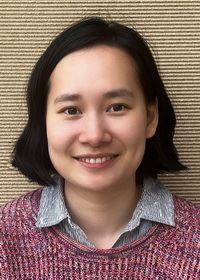 Qiyi Zhao, (Stanford) Economics (Hardardt Award)
Qiyi Zhao, (Stanford) Economics (Hardardt Award)
Qiyi is studying the Reformation's social and economic consequences, which have long interested social scientists. Her dissertation, which examines "how the Reformation arose out of existing urban economic and political structures and how it shaped subsequent economic development through institutional change," challenges a prevailing methodology in the literature. Her study urges caution in using the prevailing "distance from" variables that are popular in Reformation studies (as well as many other studies). She examines what kind of people embraced Protestantism and why, a question economics has overlooked. Finally, she examines to what extent and how Protestants and Catholics traded with each other. She brings new perspectives by "exploring the mechanisms of peaceful coexistence, which would have benefited both societies."
A professor notes that she has, "by combining all the right tools of economic history, called into question a literature that has been extremely influential."